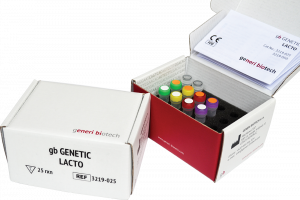gb GENETIC LACTO
Detection method:
allelic discrimination
This in vitro diagnostic kit is intended for detection of mutations LCT (C13910T) and LCT (G22018A) in the lactase gene in human genomic DNA. Detection is based on real-time polymerase chain reaction (qPCR) using fluorescently labelled probes (allelic discrimination).
Clinical implications of the CE IVD kit
Genetically determined lactose intolerance is a disorder of the metabolism of lactose (milk sugar) caused by decreased production of the lactase enzyme. Under usual conditions small intestinal cells produce lactase, which decomposes lactose into simpler sugars – glucose and galactose. These are then absorbed by the wall of the small intestine, getting into the bloodstream, and serves as an energy source.
In case of lactose intolerance the undigested lactose is accumulated in the intestine and then decomposed by intestinal bacteria. Gastrointestinal symptoms include diarrhea, abdominal discomfort, stomach cramps or bloating as a result of lactose degradation. In Europe, lactose intolerance is associated with two mutations in the regulatory region of the gene LCT at positions -13910 and -22018. This gene is responsigb ble for the level of the enzyme lactase. In the presence of alleles LCT -13910C and LCT -22018G the activity of lactase gene is much lower, which leads to lactase non-persistence. Haplotype LCT -13910T and -22018A are conversely associated with lactase persistence.
Parameters of the real-time PCR diagnostic kit
- ready-to-use assay
- sample concentration 1-100 ng/µl
- positive and negative controls included
- FAM and HEX channels detection
- identical amplification profile as gb HEMO, gb GENETIC, gb PHARM kits
Validated for:
ABI 7300 (ABI)
ABI 7500/7500 Fast (ABI)
CFX96/96Touch (Bio-Rad)
iCycler iQ5 (Bio-Rad)
Light Cycler 480/Cobas z480 (Roche Diagnostics)
MIC (BMS)
QuantStudio 5 (Applied Biosystems)
RG 3000 (Corbett Research)
RG 6000/Q (Corbett Research/Qiagen)
SmartCycler (Cepheid)

 gb SG PCR Master Mix
gb SG PCR Master Mix 

